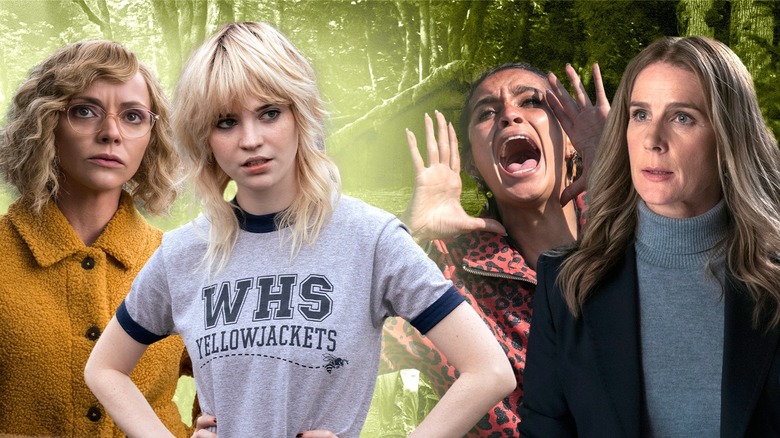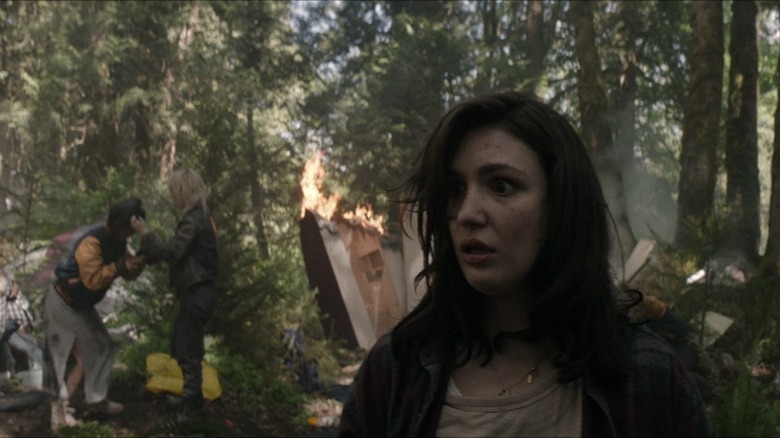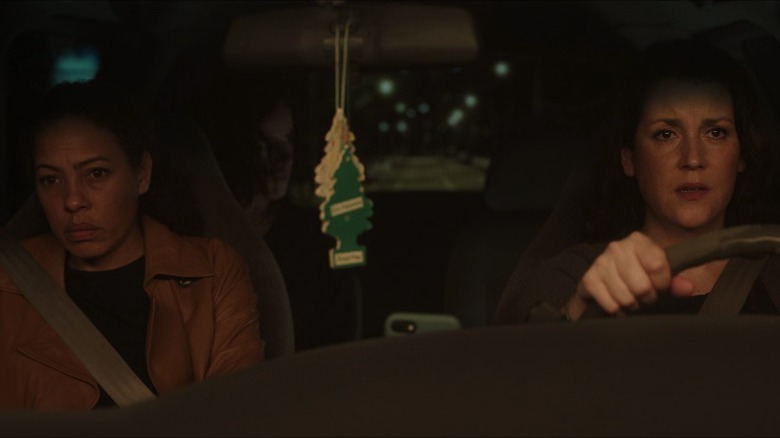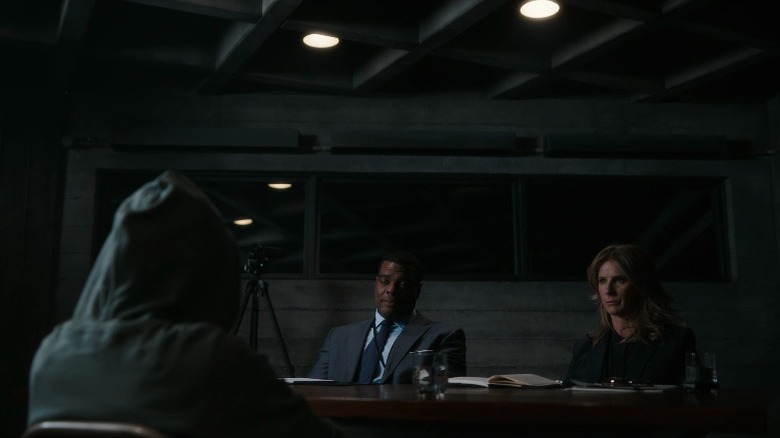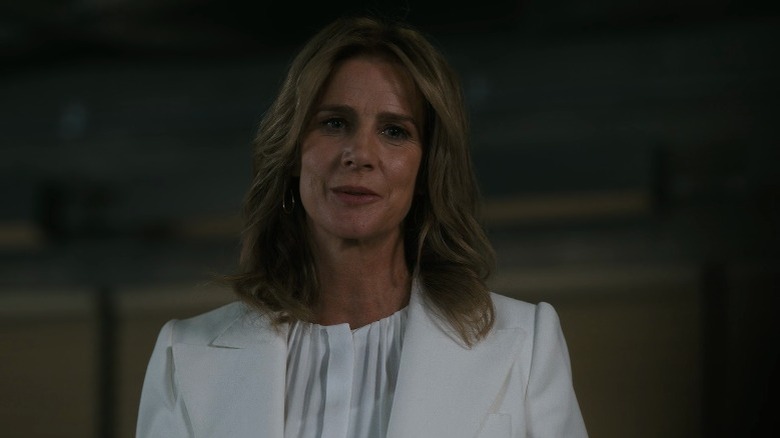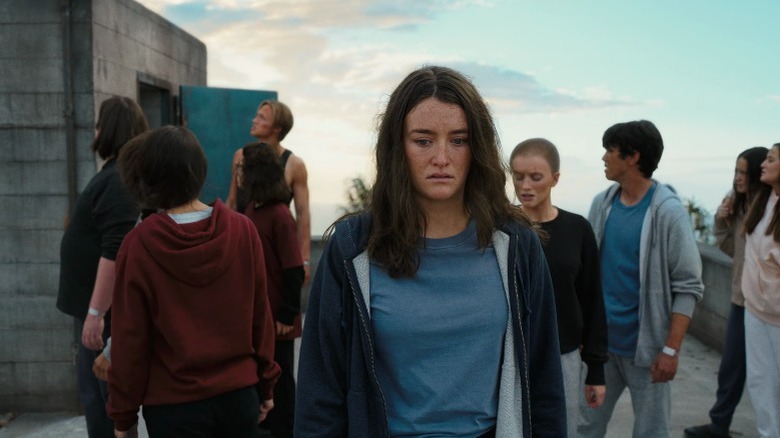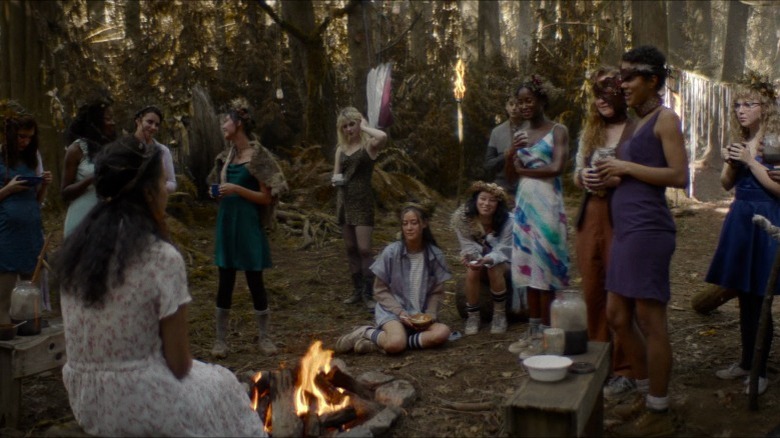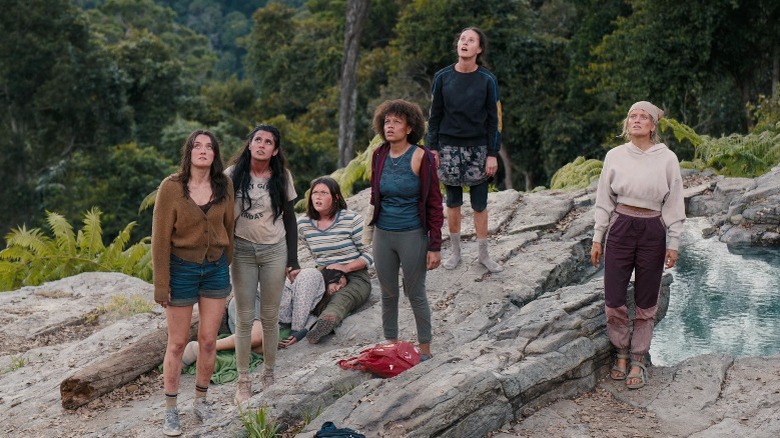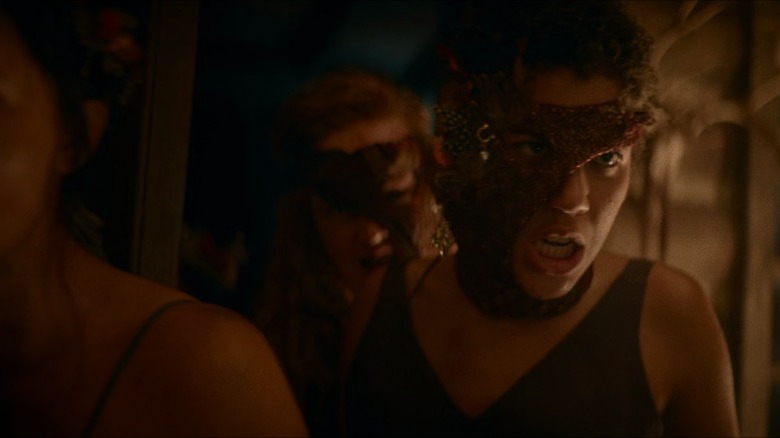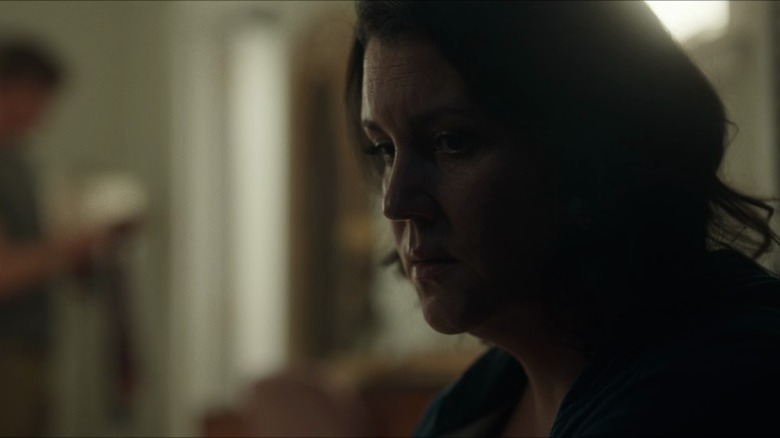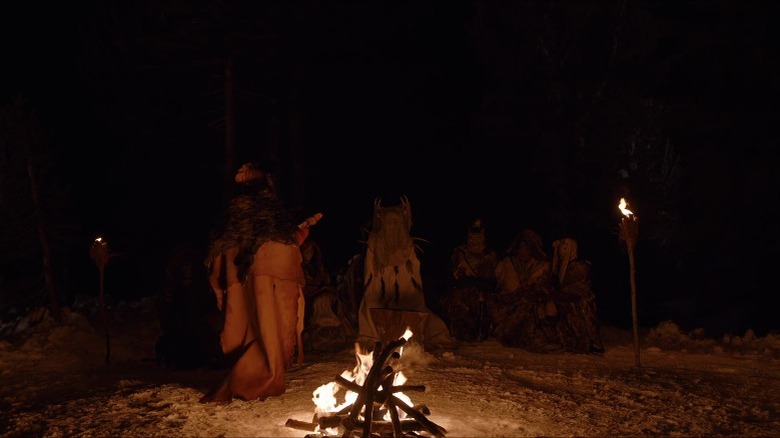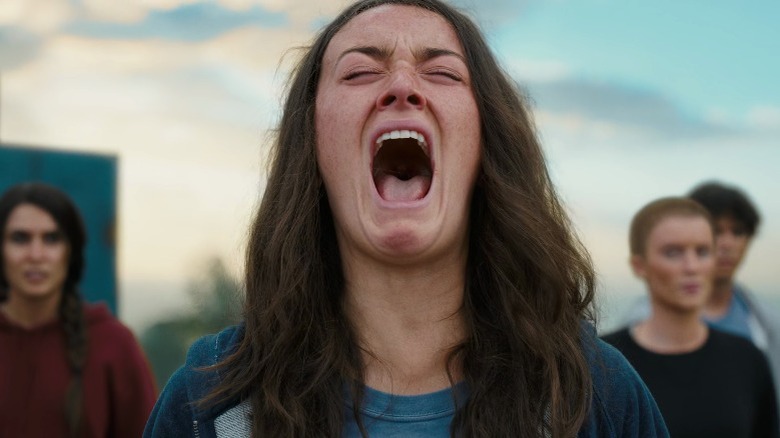Yellowjackets Is Everything The Wilds Wanted To Be And More
Everyone and their mother are buzzing about the second season of Showtime's "Yellowjackets." The psychological horror-thriller-drama-mystery series, which was created by the screenwriting duo of Ashley Lyle and Bart Nickerson, has captured the zeitgeist fully since it first premiered in November 2021, leaving audiences around the world in awe of its mastery of the tenets of great, addictive TV storytelling. The first season of "Yellowjackets" was even able to muster enough visibility, critical acclaim, and have enough cultural impact to achieve an unusual milestone for genre shows and nab multiple primetime Emmy nominations.
That's all fortunate news for the cast and crew of "Yellowjackets," of course, who are now basking in the usual rewards of coming out with the sophomore season of a hit new show, with all eyes on how they'll keep up the good work. On the other hand, this is less fortunate news for the cast and crew of another recently premiered genre drama series that shares an eerily similar premise with "Yellowjackets," and was ultimately overshadowed by it to a significant extent in the cultural imagination: Amazon Prime Video's "The Wilds," created by Sarah Streicher.
Yet, when looked at beside one another, it's no mere coincidence that "The Wilds" ultimately didn't make as much of a splash. When you compare the two, it's simply the inferior show.
Both Yellowjackets and The Wilds have very similar premises
"Yellowjackets" tells the story of the titular New Jersey high school girls' soccer team, whom — while traveling to Seattle to participate in a competition — experience a plane crash that leaves them stranded in the middle of a dense forest in Canada, and find themselves forced to fend for themselves in the wilds for over a year and a half.
"The Wilds," meanwhile, tells the story of a group of teen girls with very little prior connection to each other, who all embark on a trip to a young women's empowerment program named Dawn of Eve, and who — while on their plane, flying to Hawaii — experience a plane crash that leaves them stranded and cast away in the middle of a deserted island of unknown location, thus finding themselves forced to fend for themselves in the wilds.
Even though the way both shows develop those premises is very different — in "The Wilds," the whole thing turns out to be a carefully orchestrated and monitored social experiment, while the tragedy of "Yellowjackets" is very real and very pointless — it goes without saying that both have a very similar dynamic, vis-a-vis the whole "teen girls surviving in the wilds after a plane crash" thing. And unfortunately for "The Wilds," comparing the way that almost intrinsically interesting and multifaceted core idea is explored on both shows does it no favors next to the complexity and intensity of "Yellowjackets."
Yellowjackets is more predetermined than The Wilds, yet the stakes feel more real
One thing that drives some prospective viewers away from "Yellowjackets" is the knowledge that the series is bisected into two different timelines — one following the girls in 1996 immediately after the plane crash, and one set 25 years later, in 2021, and charting the adult lives of those who survived and how they have managed to cope in the intervening years. Some people look at that storytelling device and think, "Well, knowing beforehand who makes it in the end must take away all the fun of a survival thriller, right?" By that logic, "The Wilds" — which unfolds almost entirely in the present tense, with a few cryptic flash-forwards sprinkled throughout — would seem to have an upper hand over "Yellowjackets" as far as building suspense and anticipation goes.
In reality, knowing who makes it out of the jungle in "Yellowjackets," and seeing the women they've become, only adds to the tension and anticipation built into watching their teen selves survive, for one simple reason: We know it all matters. "Yellowjackets" approaches its out-there premise with a crudeness and directness that makes it by turns tough and addictive viewing: Not once does the show shy away from the horrors that the characters would have to endure in an equivalent real-life scenario, nor from the long-term psychological and existential consequences of said horrors. "The Wilds," by contrast, feels engineered, contrived, and ultimately somewhat airless — and that's by its very design.
Yellowjackets is all about the survival, while The Wilds splits itself into unconvincing meta-fiction
"The Wilds" is somewhat unconvincing as a survival drama because, simply put, we know that it's fake. Sure, when Gretchen Klein (Rachel Griffiths) explains her ruthless grand vision for Dawn of Eve, and when early episodes indicate that death may well be on the table via the death of Linh Bach (Chi Nguyen), aka Jeanette Dao, it's possible to believe that things could go bad. But mostly, because it's all a controlled environment being actively stimulated and tinkered with by Gretchen and her team, there's no real sense of identification to be had with the stranded girls. We're watching them from a distance, just as the Dawn of Eve operatives are: they may think that they're going through traumatic, despairing isolation, but we know they're not, and that takes away all the sense of deep, bottomless hopelessness that makes "Yellowjackets" so darkly affecting.
In "Yellowjackets," you see, there's no escape from the woods, even for the script itself. There's no grand chess master willing to send a bag of medicine down from the heavens now and then when a situation really calls for it. The crash, and the 19 ensuing months, are just something that happened. The show is about them, in a way that "The Wilds" is not, because the latter show is really about the experiment and its conduction — which are significantly less engrossing as a source of drama or thrills.
Yellowjackets integrates its themes organically, while The Wilds pays lip service to half-baked ideas
Truthfully, it's not entirely correct to say that "Yellowjackets" is about the crash and the ensuing year and a half — at least it's not just about those things. In a broader sense, it's also about group psychology, and about power dynamics, and about the teenage view of the world and how it carries within it an uneasy interplay between sincere idealism and irresistible hormonal impulsiveness. It's also about PTSD, about how trauma has consequences that linger far and wide, and about how American society is ultimately a machine that chews and spits out people who exist outside the acceptable bounds of neurotypicality. Diving even deeper, "Yellowjackets" is about death and decay, about the horror of being conscious yet constrained to a fragile sack of flesh called a body, especially when you're so young that the sack of flesh seems to exert undue influence over your consciousness.
Here's the thing: The show is about all those things organically, because they're elements present in the story being told. By contrast, "The Wilds," with its "social experiment" framing, proposes to be at once a commentary on gender and power and the formation of human societies, as Gretchen describes it, and a commentary on commentaries, a critique of ruthless academic pursuits of elusive truths. But it's a commentary on all that because it literally, explicitly comments, by way of Gretchen explaining her ideas out loud and discussing what's happening on the island.
The Wilds has less to say about gender and power than Yellowjackets
Here's the thing about Gretchen's ideas: What are they, exactly? "The Wilds" depicts her, by turns, as a well-meaning genius who thinks outside the box, and an inveterate fanatic who becomes so caught up in her own grand vision that she begins to allow the ends to justify the means. But her actual ideas are neither deep or groundbreaking enough to suggest genius, nor compelling enough that it makes all that much sense she'd go gaga trying to prove them. "If women ruled the world, it would be better" is not only a concept that would be thrown out on week two of any serious gender studies course (and not really provable by Gretchen's extremely contrived experiment), but also a seemingly fruitless one: So, if it's proven that a matriarchy would be more cooperative and fairer than the patriarchy is, what's next? Does Gretchen think the patriarchy is being upheld by people believing it's better than the alternative? Does she think merely exposing it as a bad thing will be enough to topple it?
By contrast, take "Yellowjackets" and what it says about power in situations of great strain and the attending roles, expectations and pressures placed on women. It actually grapples and wrestles with that theme, exploring what it means for and how it affects its characters. And it all goes back to the show being, at the end of the day, more interested in women's lived experiences.
Yellowjackets is all about the girls and their older selves, while The Wilds ultimately sidelines them
"Yellowjackets" can, yes, be described as a feminist show, largely by context — because it honors and takes the time to vividly render the experiences of young and middle-aged women with all the complexity, richness, darkness, variety, and centrality that our era of Prestige TV hasn't always afforded them. It's not about "Women" as an abstract social corpus the way that the Dawn of Eve program on "The Wilds" is — it's about women, lowercase, a ton of them, in all their messed-up glory, not because they've been placed into a story for being women but because they (simply enough) already have stories.
On "The Wilds," the girls are never quite allowed to flourish as characters to the same degree, because we're always looking over Gretchen's shoulder, wondering what their experiences and actions mean for the ongoing grander purpose of Making A Point About Women. Which is driven home both by the fact that Season 2 introduces a group of stranded teenage boys into the experiment and shifts a large amount of focus towards them, and by the fact that there's always a thinly-veiled implication — in Gretchen's megalomaniac, borderline sociopathic grandstanding — that she may be something of a Feminist Who's Gone Too Far. What the show misses is that the superlative of feminism is not misandrist gender essentialism, but unlimited empathy and regard for women — which is exactly what the storytelling in "Yellowjackets" has in spades.
The stories of Yellowjackets are just more interesting than The Wilds
There's actually, at the end of the day, an even simpler reason why the stranded girls' stories on "The Wilds" don't compel and move to the same degree as the ones on "Yellowjackets" — they're just not as interesting.
To put it another way, watching "The Wilds" feels like watching exactly what you'd expect to see happen in a show about teen girls stranded on a deserted island. The actresses are all wonderful, and the characters are well-defined enough, but the way that they bond, cope, fight, push on through adversity, reflect, lash out — it all feels not far-fetched or badly-written, but strangely plain. To be clear, the very same applies to the Season 2 boys; although they're also played by a wonderful, committed cast of young stars, their problems and dynamics ultimately go a very similar route to the one you might expect based on the general ensemble outline, and most of the surprise in their storyline is reserved for just the base "reveal" that teen boys are also vulnerable human beings driven by other things than pure meathead instinct. Which, well ... shocker?
"Yellowjackets," meanwhile, is a show that almost immediately became legendary for its sheer gutsiness and unending catalog of shocks, surprises, and twists that nevertheless feel entirely of a piece with all the narrative groundwork that has been laid out. It's a show that's actively thrilling to watch, in a way that "The Wilds," despite being a thriller, isn't.
Yellowjackets allows itself to misbehave more, and that makes it more fun than The Wilds
For a show that theoretically proposes, at least on paper, to depict the lengths that people can go to in order to survive, "The Wilds" always feels strangely well-behaved through and through. There's always a somber, respectful, distanced tone to the way it shows both the teens' trials and the goings-on in the Dawn of Eve backstage, and the events itself are never all that scandalous — largely due to the aforementioned control maintained by Gretchen over the whole fabricated situation.
The show often appears to want to make a point about people being better (read: more generous, more sensible, less prone to instinctual cruelty and irrationality) than we think they may be, and to try to go for more nuanced, less desperation-based conflict. But that bid for nuance often scans more like a refusal to get its hands dirty, especially next to a show like "Yellowjackets," which allows itself to probe depths of darkness, horror, violence, absurdity, and even campiness that most series could only dream of — and winds up not an iota less serious, affecting, or profound. There's no inherent merit to low-simmering storytelling if it's not done in an actually engrossing way, and "The Wilds" seems to operate from the opposite assumption — that it's enough for it to not go the "obvious" way of leaning on sex and violence and grossness, to not do things it shouldn't.
But what does "The Wilds" do? Very little.
The adult performances in Yellowjackets give it an extra layer of oomph compared to The Wilds
One of the cards up the sleeve of "Yellowjackets," so to speak, is the fact that it boasts an absolutely incredible ensemble cast. The teen actresses alone are impressive enough, from Sophie Nélisse to Jasmin Savoy Brown to Ella Purnell to Liv Hewson to Sophie Thatcher. But then that's a front where "The Wilds" could also be said to have a strong hand, seeing as it boasts the talents of Helena Howard, Shannon Berry, and Sophia Ali, among others.
What makes "Yellowjackets" so strong, ensemble-wise, is something that "The Wilds" necessarily lacks: An equally strong adult ensemble to add an extra layer of oomph and dimension to its cast of characters. It's in the present-day timeline that much of the show's most engrossing action takes place, and that's all down to the marvelous work of actors like Melanie Lynskey, Tawny Cypress, Juliette Lewis, Lauren Ambrose, and, of course, Christina Ricci — talk about a murderers' row. Half the pleasure of "Yellowjackets" is just watching all those incredible actresses do their thing, bringing to life the brittle, trauma-ridden, ever-shifting personalities of the former Yellowjackets teammates in a way that both augments and is augmented by the performances of the younger ensemble. It's no wonder that the show has already collected two Primetime Emmy nominations for acting, and we wouldn't be at all surprised to see it pick up even more in the future.
Yellowjackets is directed with a lot more personality than The Wilds
There is nothing wrong, per se, with the directing in "The Wilds" — it is competent, does its job, and manages to get the story's emotions and ideas across without much interference. But it is not exciting work, cinematically speaking. Even though the first episode is directed by Susanna Fogel, who showed significant filmmaking chops in "The Spy Who Dumped Me," and others are helmed by the likes of Haifaa Al-Mansour and Alison Maclean, the whole show has that somewhat generic Amazon Prime Video sheen of respectable mid-distance TV, without much in the way of personality or a specific eye for either beauty, horror, or hidden emotion.
Of course, it's almost unfair to compare anything to "Yellowjackets" on a directorial front when it had its first episode directed, and by extension its entire stylistic course set, by none other than Karyn Kusama — one of the best, smartest, boldest, most indefatigably exciting filmmakers of her generation. Her work on "Yellowjackets" is the kind that grabs you by the collar and never lets go. She pays attention to the rhythms of suspense building, mystery, and purposeful disorientation; the framing and cinematography are always attuned to the turbulent psychology of each character; the aesthetic choices are always replete with texture and imagination; and the whole thing feels cinematic in a way that's enlivening to watch. Thanks to Kusama's influence as both director and producer, there is nary a moment of the show that isn't stylistically exciting.
The Wilds will never be finished, and that makes it intrinsically less satisfying than Yellowjackets
This section contains spoilers for the series finale of "The Wilds."
It is not at all the fault of "The Wilds" that the show was unceremoniously canceled by Prime Video after the premiere of Season 2. Indeed, the manner in which such a cancellation was conducted was met with proper fan revolt and a lot of dissatisfaction from those who had invested so much time and so many hours into the show's story. This, of course, because "The Wilds" ends on a massive cliffhanger: In the timeline of the flash-forward, the girls and the boys finally come together in the facility where they're being interviewed — only to find that they're still stuck on the island and being monitored. What will happen to them, and to the experiment, now? We'll never know: The show ends there, and it will never be continued.
Although that's not something that should be held against the series as a detriment to its quality, the fact remains that, because of that interruption, the show will never be as satisfying to watch as "Yellowjackets," which was renewed for a third season before this one even premiered, can still be. For those who haven't seen either show, the likely preferable choice is clear. Those left bereaved by the premature nixing of "The Wilds," meanwhile, can at least take comfort in the fact that there's another show that ticks many of the same boxes with even more aplomb.
